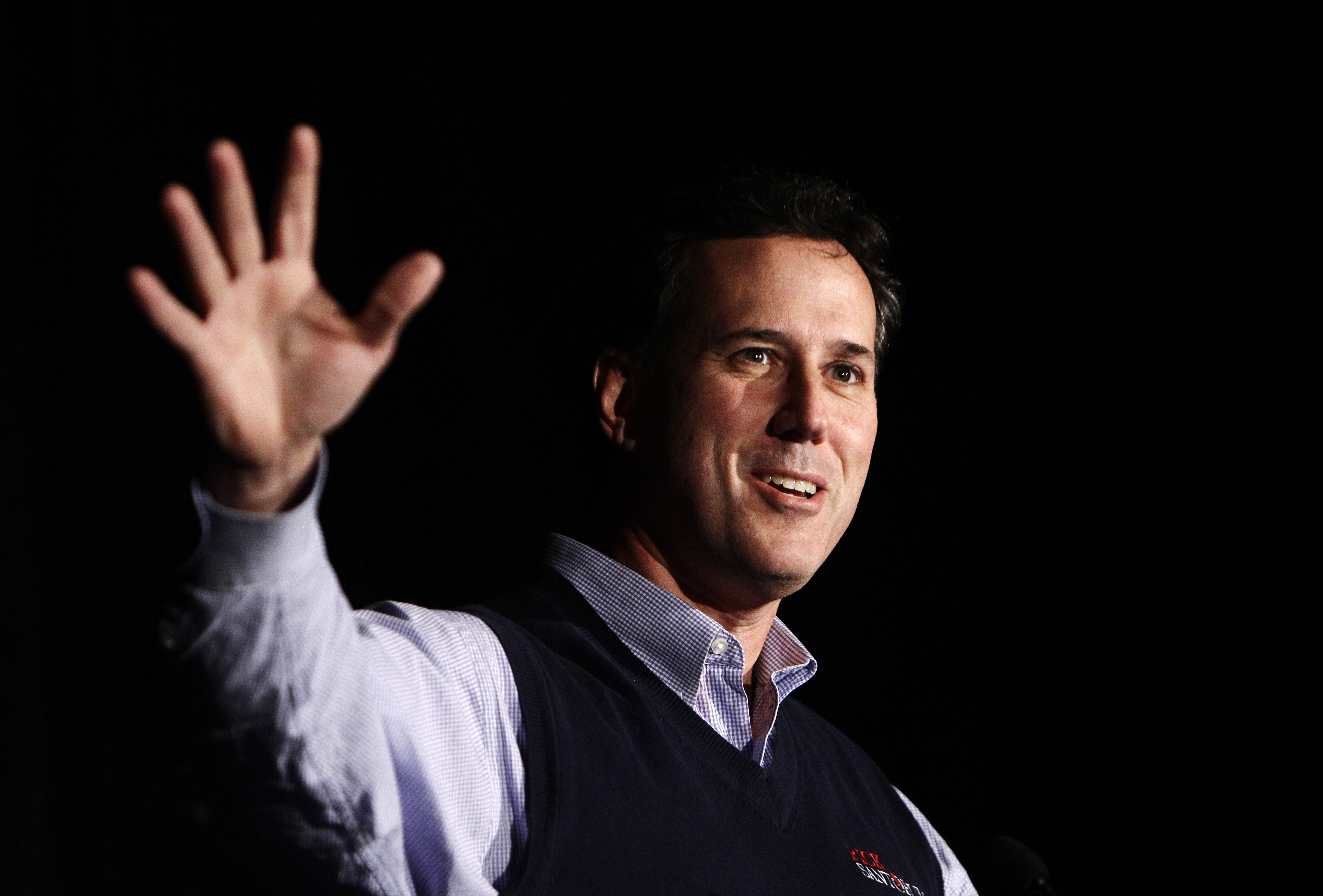Former Sen. Rick Santorum jumped ahead Tuesday night in Minnesota's Republican caucuses, hoping to extinguish front-runner Mitt Romney's modest campaign winning streak and launch a comeback of his own in the race for the party's presidential nomination.
Colorado Republicans held caucuses as well, and the 70 delegates at stake in the two states combined were the biggest one-day total so far in the GOP race to name an opponent for President Barack Obama.
Santorum triumphed in the third state on the ballot Tuesday night, winning a Missouri primary that was worth bragging rights but no delegates. They will be chosen beginning in caucuses expected to draw far more competition from Romney, Newt Gingrich and Texas Rep. Ron Paul next month.
Returns from 13 percent of Minnesota's precincts showed Santorum with 44 percent support, Paul with 27 percent and Romney - who won the state in his first try for the nomination four years ago - with 17 percent. Former House Speaker Newt Gingrich trailed with 12 percent.
The first few hundred votes counted in Colorado trended Santorum's way, as well.
Romney prevailed in both Minnesota and Colorado in 2008, the first time he ran for the nomination, but the GOP has become more conservative in both states since then under the influence of tea party activists.
There were 37 Republican National Convention delegates at stake in Minnesota and 33 more in Colorado.
Santorum, a former Pennsylvania senator, campaigned aggressively in all three states, seeking a breakthrough to revitalize a campaign that has struggled since his narrow first-place finish in the Iowa caucuses a month ago.
Paul, a Texas lawmaker, has yet to win a primary or caucus. He arrived at a caucus site in Coon Rapids, Minn., in early evening to shake hands with early arrivers, and had to squeeze his way through a crowd of autograph seekers.
Romney began the day the leader in the delegate chase, with 101 of the 1,144 needed to capture the nomination at the Republican National Convention this summer in Tampa. Gingrich had 32, Santorum 17 and Paul nine.
Taken together, the number of delegates at stake Tuesday was the largest one-day total yet in the Republican race to pick a rival for President Barack Obama. Even so, the campaigning was a pale comparison to the Iowa caucuses or primaries last month in New Hampshire, South Carolina and Florida.
Television advertising was sparse; neither Colorado nor Minnesota hosted a candidates' debate, and there was relatively little campaigning by the contenders themselves until the past few days.
The same was true in last weekend's Nevada caucuses, which Romney won on the heels of a Florida primary victory days earlier. The same pattern holds in Maine, where caucuses finish on Saturday.
Not until primaries in Michigan and Arizona on Feb. 28 is the campaign likely to regain the intensity that characterized the first few weeks of the year.
Then it roars back to life with a 10-state Super Tuesday on March 6 with 416 convention delegates at stake. Georgia, where Gingrich launched his career in Congress, is the biggest prize that night with 76 delegates. Next is Ohio, which has 63 delegates at stake and where early voting has already begun.
Santorum, in particular, hoped to seize the relative lull to redeem the promise of his Iowa victory.
He campaigned more aggressively this week than any of the other contenders, and he spent the day hopscotching from Colorado to Minnesota to Missouri in hopes of nailing down a victory in one of the states. Touting himself as a true conservative - a slap at Gingrich - he sought to undermine Romney's electability claim at the same time by predicting the former Massachusetts governor would lose to Obama.
Romney responded by assailing Santorum as an advocate of congressional earmarks - shifting the criticism he had leveled at Gingrich when the Georgian seemed a more imposing threat.
In the hours before the caucuses convened, the front-runner sought to lower expectations.
"Mitt Romney is not going to win every contest," Rich Beeson, the campaign's political director, wrote in a memo for public consumption.
"John McCain lost 19 states in 2008, and we expect our opponents will notch a few wins, too," Beeson wrote. McCain, the Arizona senator, won the Republican nomination four years ago.
In fact, Colorado and Minnesota were among the states that McCain failed to win, and he lost them to Romney.
In the four years since, the GOP has become more conservative in both. That posed a challenge for Romney, who runs as the Republican most likely to defeat Obama and is still trying to establish his credentials among tea party activists suspicious of a one-time moderate who backed abortion rights.
Two years ago in Minnesota, establishment candidates for governor were swept aside in the primary, and tea party-backed insurgents for governor and the Senate in Colorado won the party nominations.
In all three cases, Democrats won in the general election that fall.
Gingrich spent the day campaigning in Ohio, one of the primary states on March 6.
His campaign went into a downward spiral after he won the South Carolina primary in an upset. The former speaker was routed in the Florida primary to Romney, then finished a distant second in Nevada over the weekend.
